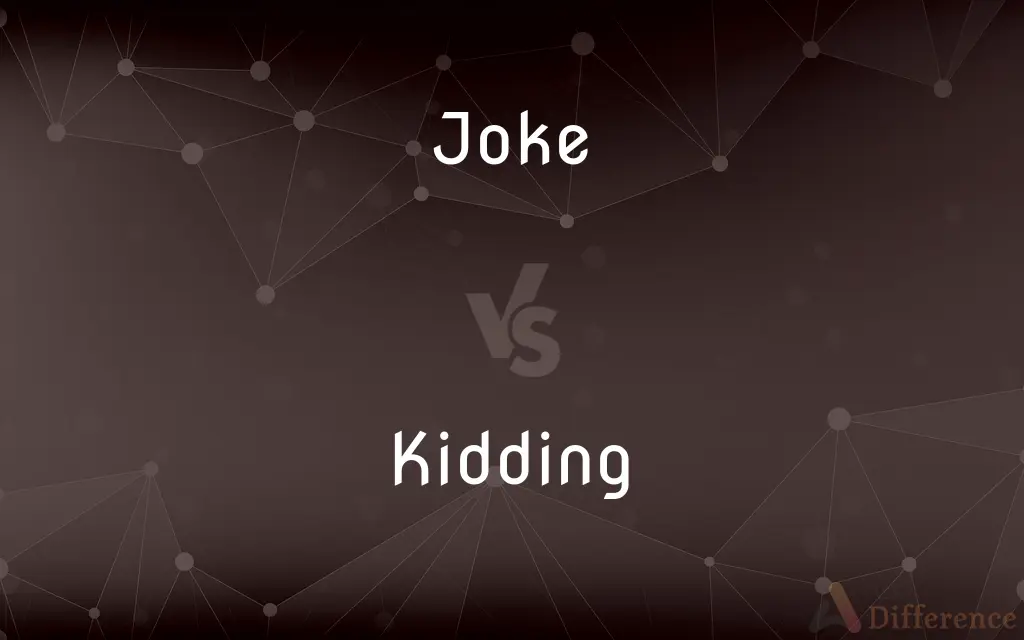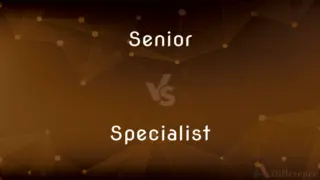Joke vs. Kidding — What's the Difference?
Edited by Tayyaba Rehman — By Urooj Arif — Updated on March 21, 2024
A joke is a structured form of humor involving a punchline, whereas kidding involves playful or teasing remarks without a formal setup.

Difference Between Joke and Kidding
Table of Contents
ADVERTISEMENT
Key Differences
A joke is a narrative or statement with a humorous twist that is intended to provoke laughter. It often follows a setup and punchline format, designed to deliver a surprising or amusing conclusion. On the other hand, kidding refers to the act of making light-hearted or teasing remarks that may not follow the structured format of a joke. Kidding can be spontaneous and relies on the context of the conversation for its humorous effect.
Jokes are crafted for comedic effect and can be shared in various formats, including verbal, written, or performed. They are a key component of stand-up comedy and humor writing. Whereas kidding is more informal and interpersonal, often occurring in casual conversations or interactions as a way of showing affection, teasing, or playfulness without the intention of crafting a comedic piece.
The appreciation of a joke can depend on the listener's understanding of the context, cultural references, and the surprise element of the punchline. Kidding, however, often depends on the relationship between the people involved and the shared context or inside jokes that may not require a structured setup or punchline.
Jokes can be categorized into multiple genres, such as knock-knock jokes, light bulb jokes, and dad jokes, each with their own structured format. Kidding, in contrast, does not have formal categories and is more about the tone and intent behind the words than about following a specific format.
While jokes are often rehearsed and can be used by comedians and entertainers to elicit laughter from an audience, kidding is a more spontaneous form of humor that arises naturally in the flow of conversation. Kidding is a way to build rapport and show familiarity with someone.
ADVERTISEMENT
Comparison Chart
Definition
A structured form of humor with a setup and punchline.
Playful or teasing remarks without a formal setup.
Format
Often follows a predictable structure.
Spontaneous and informal.
Intent
To provoke laughter through surprise or cleverness.
To tease or show affection in a light-hearted way.
Context
Can be shared across various mediums.
Typically occurs in casual, personal interactions.
Audience Reception
Dependent on understanding the punchline.
Dependent on personal relationships and context.
Compare with Definitions
Joke
A short story or anecdote designed to provoke laughter.
The joke about the chicken crossing the road never fails to amuse.
Kidding
Behaving or speaking in a jesting manner.
Are you kidding me? That's amazing!
Joke
A humorous observation.
His joke about time travel went over everyone's heads.
Kidding
Making playful or teasing remarks.
I was just kidding about being a secret agent.
Joke
A thing that someone says to cause amusement or laughter.
He told a joke to lighten the mood.
Kidding
Not meant to be taken seriously.
I'm kidding, of course, I would never do that.
Joke
Something not to be taken seriously.
Their offer was a joke, far below what we expected.
Kidding
To deceive or trick playfully.
She kidded her brother into thinking she had forgotten his birthday.
Joke
A trick or deception.
The surprise party was just a joke to get her to the right place.
Kidding
Expressing disbelief.
You must be kidding! You really won?
Joke
A joke is a display of humour in which words are used within a specific and well-defined narrative structure to make people laugh and is usually not meant to be taken seriously. It takes the form of a story, usually with dialogue, and ends in a punch line.
Kidding
Kidding is an American comedy-drama television series created by Dave Holstein that premiered on September 9, 2018, on Showtime. The series stars Jim Carrey, Frank Langella, Judy Greer, Cole Allen, Juliet Morris, and Catherine Keener.
Joke
Something said or done to evoke laughter or amusement, especially an amusing story with a punch line.
Kidding
A young goat.
Joke
A mischievous trick; a prank
Played a joke on his roommate.
Kidding
One of the young of certain similar animals.
Joke
Something that is of ludicrously poor quality
Their delivery service is a joke.
Kidding
The flesh of a young goat.
Joke
Something not to be taken seriously; a triviality
The accident was no joke.
Kidding
Leather made from the skin of a young goat; kidskin.
Joke
An object of amusement or laughter; a laughingstock
His loud tie was the joke of the office.
Kidding
An article made from this leather.
Joke
To tell or play jokes; jest.
Kidding
A child.
Joke
To speak in fun; be facetious
You have to be joking.
Kidding
A young person.
Joke
To say or write as a joke.
Kidding
(Slang)Pal. Used as a term of familiar address, especially for a young person
Hi, kid! What's up?.
Joke
An amusing story.
Kidding
Made of the skin or with the meat of a young goat.
Joke
Something said or done for amusement, not in seriousness.
It was a joke!
Kidding
(Informal)Younger than oneself
My kid brother.
Joke
(figuratively) The root cause or main issue, especially an unexpected one
Kidding
To mock playfully; tease
They kidded me about my mismatched socks.
Joke
(figuratively) A laughably worthless thing or person; a sham.
Your effort at cleaning your room is a joke.
The president was a joke.
Kidding
To deceive in fun; fool
I could only hope they were kidding me when they said my car had been stolen.
Joke
(figuratively) Something that is far easier or far less challenging than expected.
The final exam was a joke.
Kidding
To deceive (oneself), especially by allowing one's desires to cloud one's judgment
You're kidding yourself if you think that plan will work.
Joke
(intransitive) To do or say something for amusement rather than seriously.
I didn’t mean what I said — I was only joking.
Kidding
To engage in teasing or good-humored fooling
You want that much for your old car? You must be kidding!.
Joke
(intransitive, followed by with) To dupe in a friendly manner for amusement; to mess with, play with.
Relax, man, I'm just joking with you.
Kidding
To bear young. Used of a goat or similar animal.
Joke
To make merry with; to make jokes upon; to rally.
To joke a comrade
Kidding
Present participle of kid
Joke
Something said for the sake of exciting a laugh; something witty or sportive (commonly indicating more of hilarity or humor than jest); a jest; a witticism; as, to crack good-natured jokes.
And gentle dullness ever loves a joke.
Or witty joke our airy senses movesTo pleasant laughter.
Kidding
The action of the verb kid.
Joke
Something not said seriously, or not actually meant; something done in sport.
Inclose whole downs in walls, 't is all a joke.
Kidding
(agriculture) The act of a goat giving birth.
Joke
To make merry with; to make jokes upon; to rally; to banter; as, to joke a comrade.
Joke
To do something for sport, or as a joke; to be merry in words or actions; to jest.
He laughed, shouted, joked, and swore.
Joke
A humorous anecdote or remark intended to provoke laughter;
He told a very funny joke
He knows a million gags
Thanks for the laugh
He laughed unpleasantly at hisown jest
Even a schoolboy's jape is supposed to have some ascertainable point
Joke
Activity characterized by good humor
Joke
A ludicrous or grotesque act done for fun and amusement
Joke
A triviality not to be taken seriously;
I regarded his campaign for mayor as a joke
Joke
Tell a joke; speak humorously;
He often jokes even when he appears serious
Joke
Act in a funny or teasing way
Common Curiosities
What makes a good joke?
A good joke typically has an unexpected twist or punchline that surprises and amuses the audience.
How do cultural differences affect jokes and kidding?
Cultural background influences what individuals find funny, affecting the reception of both jokes and kidding.
Can kidding be harmful?
While meant to be playful, kidding can sometimes be misunderstood or hurtful if not attuned to the listener's feelings.
Can a joke be considered kidding?
A joke can be part of kidding if it's used in a playful and teasing manner within a conversation.
Can jokes and kidding improve relationships?
Shared laughter and light-hearted teasing can strengthen bonds and ease tensions in relationships.
Can jokes change over time?
Yes, jokes evolve with language, culture, and societal norms, reflecting changes in what is considered humorous.
Why do some people not understand jokes?
Differences in language, culture, or a lack of context can lead to misunderstandings of jokes.
How do you know when someone is kidding?
Vocal tone, body language, and the familiarity of the relationship usually indicate when someone is kidding.
Is it possible to learn how to be better at joking or kidding?
Yes, practice, observing reactions, and understanding your audience can improve one's joking and kidding skills.
What role do jokes play in society?
Jokes can act as a social lubricant, easing interactions and fostering a sense of community.
Is kidding always humorous?
Kidding is intended to be light-hearted, but its humor depends on the context and the relationship between the people involved.
Do jokes and kidding require a specific setting?
Jokes can be shared across various settings, while kidding often thrives in informal and personal interactions.
Is there a time when joking or kidding is inappropriate?
Sensitivity to context, such as during solemn or serious occasions, dictates the appropriateness of joking or kidding.
Are there rules for kidding?
Basic social etiquette and sensitivity towards others' feelings serve as unwritten rules for kidding.
Share Your Discovery

Previous Comparison
Senior vs. Specialist
Next Comparison
Adventure vs. ExperienceAuthor Spotlight
Written by
Urooj ArifUrooj is a skilled content writer at Ask Difference, known for her exceptional ability to simplify complex topics into engaging and informative content. With a passion for research and a flair for clear, concise writing, she consistently delivers articles that resonate with our diverse audience.
Edited by
Tayyaba RehmanTayyaba Rehman is a distinguished writer, currently serving as a primary contributor to askdifference.com. As a researcher in semantics and etymology, Tayyaba's passion for the complexity of languages and their distinctions has found a perfect home on the platform. Tayyaba delves into the intricacies of language, distinguishing between commonly confused words and phrases, thereby providing clarity for readers worldwide.













































